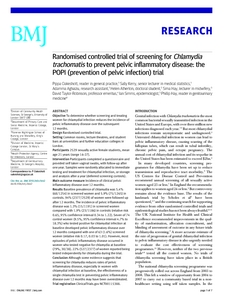Oakeshott, P; Kerry, S; Aghaizu, A; Atherton, H; Hay, S; Taylor-Robinson, D; Simms, I; Hay, P
(2010)
Randomised controlled trial of screening for Chlamydia trachomatis to prevent pelvic inflammatory disease: the POPI (prevention of pelvic infection) trial.
BRITISH MEDICAL JOURNAL, 340 (c1642).
ISSN 0959-535X
https://doi.org/10.1136/bmj.c1642
SGUL Authors: Hay, Phillip Edward Kerry, Sally Margaret Oakeshott, Philippa
![[img]](https://openaccess.sgul.ac.uk/1148/1.hassmallThumbnailVersion/bmj.c1642.pdf)  Preview |
|
["document_typename_application/pdf; charset=binary" not defined]
Published Version
Download (126kB)
| Preview
|
Abstract
OBJECTIVE: To determine whether screening and treating women for chlamydial infection reduces the incidence of pelvic inflammatory disease over the subsequent 12 months.
DESIGN: Randomised controlled trial.
SETTING: Common rooms, lecture theatres, and student bars at universities and further education colleges in London. PARTICIPANTS: 2529 sexually active female students, mean age 21 years (range 16-27).
INTERVENTION: Participants completed a questionnaire and provided self taken vaginal swabs, with follow-up after one year. Samples were randomly allocated to immediate testing and treatment for chlamydial infection, or storage and analysis after a year (deferred screening controls).
MAIN OUTCOME MEASURE: Incidence of clinical pelvic inflammatory disease over 12 months.
RESULTS: Baseline prevalence of chlamydia was 5.4% (68/1254) in screened women and 5.9% (75/1265) in controls. 94% (2377/2529) of women were followed up after 12 months. The incidence of pelvic inflammatory disease was 1.3% (15/1191) in screened women compared with 1.9% (23/1186) in controls (relative risk 0.65, 95% confidence interval 0.34 to 1.22). Seven of 74 control women (9.5%, 95% confidence interval 4.7% to 18.3%) who tested positive for chlamydial infection at baseline developed pelvic inflammatory disease over 12 months compared with one of 63 (1.6%) screened women (relative risk 0.17, 0.03 to 1.01). However, most episodes of pelvic inflammatory disease occurred in women who tested negative for chlamydia at baseline (79%, 30/38). 22% (527/2377) of women reported being tested independently for chlamydia during the trial.
CONCLUSION: Although some evidence suggests that screening for chlamydia reduces rates of pelvic inflammatory disease, especially in women with chlamydial infection at baseline, the effectiveness of a single chlamydia test in preventing pelvic inflammatory disease over 12 months may have been overestimated.
| Item Type: |
Article
|
| Additional Information: |
PubMed ID: 20378636
© Oakeshott et al 2010. This is an open-access article distributed under the terms of the Creative Commons Attribution Non-commercial License, which permits use, distribution, and reproduction in any medium, provided the original work is properly cited, the use is non commercial and is otherwise in compliance with the license. |
| Keywords: |
Adolescent, Chlamydia Infections, Chlamydia trachomatis, Female, Humans, Incidence, London, Mass Screening, Middle Aged, Pelvic Inflammatory Disease, Sexual Behavior, Sexual Partners, Young Adult, Science & Technology, Life Sciences & Biomedicine, Medicine, General & Internal, General & Internal Medicine, BACTERIAL VAGINOSIS, WOMEN, DIAGNOSIS, ENGLAND, COHORT, RATES |
| SGUL Research Institute / Research Centre: |
Academic Structure > Infection and Immunity Research Institute (INII)
Academic Structure > Population Health Research Institute (INPH) |
| Journal or Publication Title: |
BRITISH MEDICAL JOURNAL |
| ISSN: |
0959-535X |
| Related URLs: |
|
| Dates: |
| Date | Event |
|---|
| 8 April 2010 | Published |
|
| Web of Science ID: |
WOS:000276639500001 |
  |
Download EPMC Full text (PDF)
|
 |
Download EPMC Full text (HTML)
|
| URI: |
https://openaccess.sgul.ac.uk/id/eprint/1148 |
| Publisher's version: |
https://doi.org/10.1136/bmj.c1642 |
Statistics
Item downloaded times since 30 Apr 2012.
Actions (login required)
 |
Edit Item |



